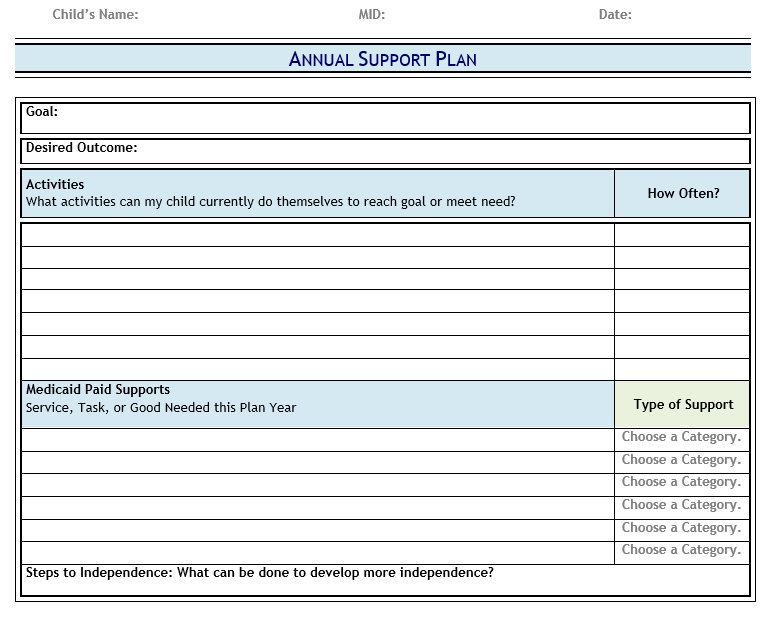Under a mandate from the federal government, the State of Idaho had to quickly adapt their Family Directed Services program to separate intervention and support services. One outcome of this change was the creation of a new professional opportunity: the Independent Behavioral Interventionist (IBI).
These individuals deliver direct intervention services that “utilize techniques to produce positive meaningful changes” in the client’s behavior. Typically, this involves teaching functional replacement behaviors, leveraging reinforcement-based strategies and helping clients to build new skills. The State requires IBIs to utilize evidence-based or evidence-informed practices in their work. This service also includes educating family members and other caregivers about how to best generalize skills and approaches in the client’s daily life. BI services can be provided in individual or in group settings, so long as the number and needs of the participants are considered and appropriate for group intervention.
There are several related services that BIs can provide which include: crisis intervention, habilitation intervention services, habilitative skill building, interdisciplinary training, qualification assessments and writing Assessment & Clinical Treatment Plans (ACTP), assuming they meet any additional criteria for these services.
Interventionists can be approved into one of seven categories:
Crisis Intervention Technician (CIT),
Intervention Technician (IT),
Intervention Specialist (IS),
Intervention Professional (IP),
Evidence-Based Model Intervention Paraprofessional (EBM IPA)
Evidence-Based Model Intervention Specialist (EBM IS) or
Evidence-Based Model Intervention Professional (EBM IP)
The first two categories (CIT and IT) can only operate within the DDA environment and are roles intended for college students who wish to work while completing their degree. The EBM IPA does not have to have a degree, but does require model-dictated supervision and a para-level certification in the model being applied.
The remaining four categories (IS, IP, EBM IS and EBM IP) are independent providers who bill Medicaid directly. These providers must maintain general liability insurance coverage, document activities with clients and complete 12 hours of continuing education annually. The IS provider must also receive regular supervision by another provider. For our purposes, we will focus in only on the specific qualifications for these independent provider options.
ISs must have: 1) a Bachelor’s degree in psychology, education or ABA or a Bachelor’s degree in another field with at least 24 semester credits (or the equivalent) in a human services area and 2) complete a 40+ hour ABA training program and 3) have at least 1,040 hours of supervised experience working with participants with functional or behavioral needs and 4) have an active CPR/First Aid certification
IPs must have: 1) a Master’s or Doctoral degree in psychology, education, ABA or a Master’s or 2) a Doctoral degree in another field and 1,500+ hours of relevant coursework and/or training in child development, learning theory, positive behavior support techniques, dual diagnosis or behavior analysis and 3) 1,200+ hours of relevant experience implementing comprehensive behavioral therapies to participants with functional or behavioral needs.
EBM ISs must: 1) be supervised in accordance with their model-dictated requirements, 2) hold a Bachelor’s degree and 3) hold a bachelor-level certification in the approved evidence-based model (BCBA or Early Start Denver) they are applying.
EBM IPs must: 1) hold a Master’s or Doctoral level degree and 2) hold a masters-level certification in the approved evidence-based model (BCBA or Early Start Denver) they are applying.
The reimbursement rates for BI services range from $35 to $64 per billable hour, depending on the service provided and the provider’s category (above).
If this Independent Provider role sounds like a good fit for you, you will first need to work your way through the Medicaid and DHW approval process. You can find step-by-step instructions here: https://publicdocuments.dhw.idaho.gov/WebLink/DocView.aspx?id=16256&dbid=0&repo=PUBLIC-DOCUMENTS
Once approved, you can connect up with families who are seeking services on the Idaho Behavioral Intervention Independent Provider Facebook page. You can also find active opportunities here on our BI Jobs page.
What other questions do you have about becoming an Independent Provider in Idaho? Please post them in the comments and I will circle back to answer them.
Please note: All information provided is based on the author’s personal experience and perspective. For definitive information about Independent Provider positions and processes, please visit DHW’s website: https://healthandwelfare.idaho.gov/providers/home-and-community-based-services-children-developmental-disabilities/independent
About the Author: Angela Watts is the founder of TheraJobs and the parent of a child with a developmental disability. She also founded the local BI Provider Facebook group mentioned above and serves as an Idaho Support Broker.











